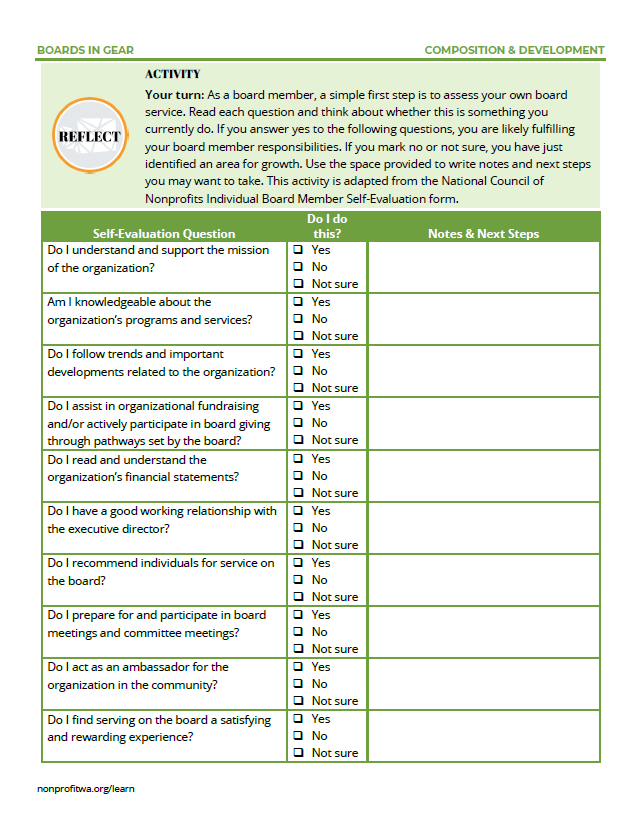Along with a process to coordinate recruitment, selection, and orientation of new board members, the board should establish a plan for evaluation and ongoing learning. Each year the board should reflect on their own practices, celebrate achievements, and create plans around areas of growth.
Why is board evaluation important?
Establishing an annual process to assess or evaluate the board’s effectiveness can help identify areas that need clarification, potential skill or experience gaps on the board, and topics for ongoing board learning. Evaluating your work as a board and as an individual board member may bring up some uneasy feelings. Talk as a board to create a shared understanding around how an evaluation process will help strengthen board practices, ultimately supporting the advancement of the organization’s mission.
Evaluation approaches
There are many approaches to board evaluation, and a good staring place is a self-assessment process. In addition to the sample evaluation below, the National Council of Nonprofits has a resource page on Self-Assessments for Nonprofit Boards that includes practice pointers and a variety of resources.

The first step in strengthening your board’s culture is to assess your current culture. Use the following “Know Your Board Culture” worksheet to note how you would describe your culture across the three aspects (artifacts, behaviors, and underlying values). Then describe how you want your board culture to be in the future. Remember, you can change the culture.

Board Member Self Evaluation Activity
Read each question and think about whether this is something you currently do. If you answer yes to the following questions, you are likely fulfilling your board member responsibilities. If you mark no or not sure, you have just identified an area for growth. Use the space provided to write notes and next steps you may want to take. This activity is adapted from the National Council of Nonprofits Individual Board Member Self-Evaluation form.
DownloadMaintaining a strong board
Strong boards reflect on their own practices, celebrate achievements, and create plans around identified growth areas. Convening a board development committee to coordinate the recruitment, selection, and orientation process as well as evaluation and learning may benefit your board. Based on your annual board assessment/evaluation, develop a learning plan that addresses your board’s prioritized needs. Weaving the learning topics into board meetings is a great approach and an opportunity to engage different board members throughout the year to lead learning activities.
Generally, there are three areas of board learning that should be included in your plan.
- Learning about your organization (programs, services, etc.)
- Learning about nonprofit practices (finance, advocacy, fundraising, etc.)
- Learning about the larger cause in which your nonprofit is working
Lastly, think about how your organization trains and develops board officers. Consider how your board can strengthen pathways board members can take towards officer positions and mentoring opportunities when members step into these vital roles.